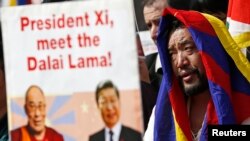LONDON —
China’s President Xi Jinping is wrapping up a week-long tour of Europe aimed at fostering better economic ties with its number one trading partner.
Observers say long-held concerns over human rights in China continue to hamper relation. But Europe also is seeking China’s diplomatic backing in its dispute with Russia over Ukraine.
Spectators applauded as the Xi toured a zoo outside Brussels Sunday to see his country’s traditional tool of diplomacy - pandas. Two animals were lent to Belgium in advance of the visit - the first by a Chinese president in four decades of relations between Beijing and the European Union.
Trade topped the agenda at talks Monday. Both sides are anxious to deepen their shared economic relationship, says Jonathan Fenby, former editor of the South China Morning Post and author of "Will China Dominate the 21st Century?"
“China for some time has wanted to build up relations with the EU really as a counter to the power of the United States,” he said.
Xi pressed EU leaders to consider a free trade deal with China. But Europe has voiced concerns that Chinese firms circumvent international trade rules. Last year a dispute over the price of solar panels led to the EU imposing import tariffs. China responded with restrictions on imports of European wine.
Jonathan Fenby says that friction has caused divisions in Europe.
“China on the whole prefers bilateral relationships rather than broader relationships which might diminish its freedom of action," he said. "And Europe on the other hand has really had longstanding divides among the members of the European Union about whether the relationship with China should be purely commercial, whether politics should come into it; whether human rights should come into it.”
Outside the talks, campaigners tried to force human rights onto the agenda - accusing China of committing gross violations against Tibetans and minority Uighur communities. Among them was Tibetan immigrant Tenzin Namgyal.
"We want President Xi Jinping to immediately start a dialogue with His Holiness, the Dalai Lama, and immediately release all the political prisoners,” he said.
Relations between the EU and Russia have deteriorated sharply after Moscow’s annexation of Crimea. China abstained from voting on a U.N. Security Council resolution affirming Ukraine's territorial integrity.
Speaking in Berlin Friday, XI did not condemn or support Russia’s actions. He said that the Chinese government accepts the basic principle of international relations to not get involved in the internal affairs of a sovereign country and to accept the sovereignty and integrity of all countries.
The overthrow of former Ukrainian President Viktor Yanukovich put China in a difficult position, says Jonathan Fenby.
“China obviously cannot be expected to be sympathetic with a new regime in Kyiv which has come to power on the back of a revolt and demonstrations against an authoritarian regime,” he said.
Fenby says China also is wary of siding with Russia, fearing it may provoke Washington to further pivot its military balance toward Asia.
Observers say long-held concerns over human rights in China continue to hamper relation. But Europe also is seeking China’s diplomatic backing in its dispute with Russia over Ukraine.
Spectators applauded as the Xi toured a zoo outside Brussels Sunday to see his country’s traditional tool of diplomacy - pandas. Two animals were lent to Belgium in advance of the visit - the first by a Chinese president in four decades of relations between Beijing and the European Union.
Trade topped the agenda at talks Monday. Both sides are anxious to deepen their shared economic relationship, says Jonathan Fenby, former editor of the South China Morning Post and author of "Will China Dominate the 21st Century?"
“China for some time has wanted to build up relations with the EU really as a counter to the power of the United States,” he said.
Xi pressed EU leaders to consider a free trade deal with China. But Europe has voiced concerns that Chinese firms circumvent international trade rules. Last year a dispute over the price of solar panels led to the EU imposing import tariffs. China responded with restrictions on imports of European wine.
Jonathan Fenby says that friction has caused divisions in Europe.
“China on the whole prefers bilateral relationships rather than broader relationships which might diminish its freedom of action," he said. "And Europe on the other hand has really had longstanding divides among the members of the European Union about whether the relationship with China should be purely commercial, whether politics should come into it; whether human rights should come into it.”
Outside the talks, campaigners tried to force human rights onto the agenda - accusing China of committing gross violations against Tibetans and minority Uighur communities. Among them was Tibetan immigrant Tenzin Namgyal.
"We want President Xi Jinping to immediately start a dialogue with His Holiness, the Dalai Lama, and immediately release all the political prisoners,” he said.
Relations between the EU and Russia have deteriorated sharply after Moscow’s annexation of Crimea. China abstained from voting on a U.N. Security Council resolution affirming Ukraine's territorial integrity.
Speaking in Berlin Friday, XI did not condemn or support Russia’s actions. He said that the Chinese government accepts the basic principle of international relations to not get involved in the internal affairs of a sovereign country and to accept the sovereignty and integrity of all countries.
The overthrow of former Ukrainian President Viktor Yanukovich put China in a difficult position, says Jonathan Fenby.
“China obviously cannot be expected to be sympathetic with a new regime in Kyiv which has come to power on the back of a revolt and demonstrations against an authoritarian regime,” he said.
Fenby says China also is wary of siding with Russia, fearing it may provoke Washington to further pivot its military balance toward Asia.
